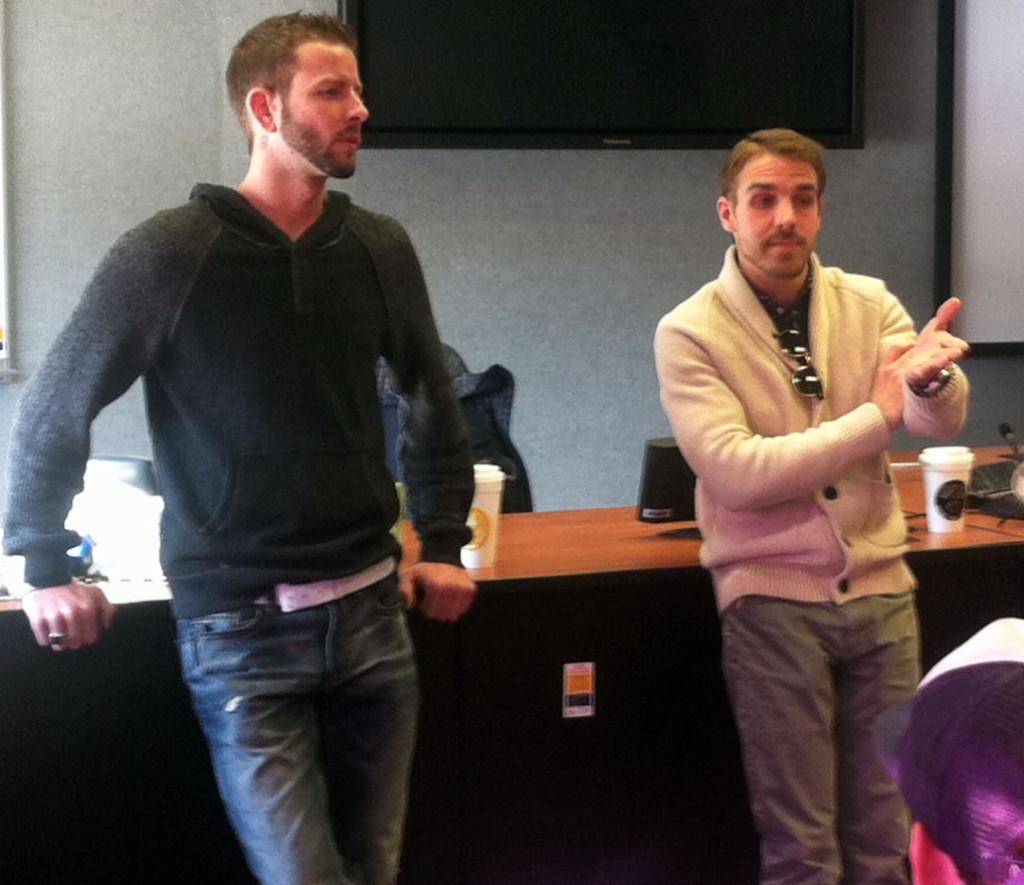A safe space
New student organization provides outlet for students recovering from drug and alcohol addiction
Nick Wozniak, left, and Matt Dillon sharing their experience on defeating alcoholism with students who have gotten under-aged drinking tickets at the Old Library. – Photo by Tyler Henderson
December 10, 2014
Nick Wozniak wasn’t sure he would get another chance at freedom.
With felonies piling up in the wake of another drunk driving accident, he found his rock-bottom in the form of a probable prison sentence due to an extensive record of drug and alcohol abuse.
But Chippewa County Drug Court offered him a shot at redemption. Now the 30-year-old Chippewa Valley Technical College student works to help others avoid the fate he so narrowly avoided.
“(Drug Court) saved my life,” he said. “It’s part of the reason I’m sober today. It made me accountable for my actions.”
Wozniak even embraced his title of “alcoholic” when he was younger. He now sees an entirely different picture when looking back on those years.
“Did I see it as a problem? Yes, but I thought I was going to manage it,” he said. “I was just keeping my head above the water, making it look good, but underneath the water I was paddling hard.”
Wozniak, who plans to transfer to UW-Eau Claire, has been working to bring a similar support system to the UWEC campus as he helps with the new student organization, Sharing our Strength. According to S.O.S. ‘s website, it is a recovery-focused student organization seeking to help students facing addiction issues. Matt Dillon, a graduate student at UWEC and recovering alcoholic, is one of the founders of the organization that started just before this school year.
“We just wanted an organization that could get together as a group of people who want to live a healthy lifestyle,” Dillon said. “(One) that doesn’t have to be centered around drinking or drugs.”
Dillon’s battle with alcoholism is closely tied to his time in college. Starting at UWEC as a freshman in 2004, he and his friends would frequent bars and binge-drink with little thought of the consequences.
“We got blackout wasted and then just woke up and high-fived about it the next morning,” he said.
Dillon didn’t see college as the main reason for his addiction, but he acknowledged how easy it can be to turn binge drinking into a routine while in college.
“College didn’t give me alcoholism,” he said. “But it supported the way that I drank.”
Mayo Clinic defines alcoholism as a “chronic and often progressive disease that includes problems controlling your drinking, being preoccupied with alcohol, continuing to use alcohol even when it causes problems, having to drink more to get the same effect or having withdrawal symptoms when you rapidly decrease or stop drinking.”
Matt Anderson, M.S., an addiction counselor at Mayo Clinic, said it’s not rare for college students to come in for alcohol and drug abuse counseling.
“I think it’s a huge culture in colleges across the country,” he said. “The culture of drinking, the social setting, the sense of fitting in… People of all walks of life are looking for a sense of belonging, and often times that’s where students find it.”
Anderson is encouraged by the number of college students that recognize that they are suffering from alcoholism.
“It’s promising because people are starting to get the message that you don’t have to be middle aged to struggle with alcoholism,” he said. “More young people are getting help.”
Both Wozniak and Dillon had defining times in their lives when they turned to a program for help. Wozniak said the last time he was in court for a previous crash, the District Attorney said Wozniak’s had enough chances.
“I thought I was going to prison,” Wozniak said.
Instead, he went into rehabilitation. Wozniak hopes that S.O.S. can be something students can turn to as a preventative process, giving them resources that prevent them from standing in front of a judge like he did years ago.
A study posted by Business Insider this year listed UWEC as one of the 20 worst colleges for drug and alcohol arrests. While the statistics don’t account for effectiveness of the campus police departments, the 9.38 arrests per 1,000 students was 17th most in the nation.
The school has counseling services for those dealing with addiction issues, as well as a class for students with under-aged drinking tickets. But until S.O.S., there wasn’t a safe space for students to meet other students dealing with the same addiction problems.
Dillon said by providing that opportunity for camaraderie is essential to recovery. The goal was to connect students with addiction problems with relevant resources, he said.
While the group is not affiliated with Alcoholics Anonymous or any other similar group, they hope that having members with experience regarding alcoholism can provide an extra resource to students in need.
Sharing our Strength meets on Friday mornings at 9 a.m. and interested individuals can find their contact information through the contact page on their website.

